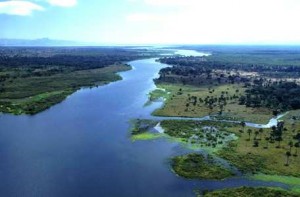Blue Gold could ignite military conflict
Published on February 27, 2012 at 10:16 AM by FACE OF MALAWI
 Expert warns of future SADC water conflicts. Africa faces absolute water shortages by 2025
Expert warns of future SADC water conflicts. Africa faces absolute water shortages by 2025
Recent statistics and developments indicate that availability of the precious liquid ? or blue gold as it is now called ? is declining and has the potential to be a major source of military conflict.
The Nsanje Inland Port on Shire River sparked a diplomatic dispute
And SADC is not immune to the problem.
According to the Organisation for Economic Co-operation and Development’s Environmental Outlook to 2030 Report, about 1.2 billion people are living in areas of water scarcity, while 47 percent of the global population will live in areas of high water stress by 2030.
It is statistics such as these that have analysts worrying that future wars will be fought over blue gold, as thirsty people, opportunistic politicians and powerful corporations battle for dwindling resources.
Last week an official in Malawi’s Ministry of Agriculture and Irrigation, Henrie Manford Njiloma, warned that rising populations and industrial development in SADC were resulting in increased water demand and could cause political instability if not managed well.
In particular reference to Malawi, he said: “Despite enjoying political stability internally and peaceful coexistence with neighbours, subtle issues in the Malawian water sector affecting both internal and external political stability exist and hence as seen elsewhere in the world could be a cause for future conflicts.”
Speaking at a climate change symposium, Njiloma noted that water-related issues had become some of the most contentious, causing social suffering, strife and misery among people in some parts of the world.
“Countries have fought contesting control of shared waters,” he said, pointing out that Africa south of the Sahara was likely to experience absolute water shortages by 2025.
He cited Malawi’s recent diplomatic dispute with Mozambique over the ambitious Nsanje Inland Port on Shire River. The river flows into neighbouring Mozambique.
There was a stand-off in the 1980s between Malawi and Tanzania due to flooding of Lake Malawi. Malawi was accused of blocking the Shire River at Liwonde Barrage.
Njiloma urged co-ordinated approaches among SADC states to avoid water disputes.


